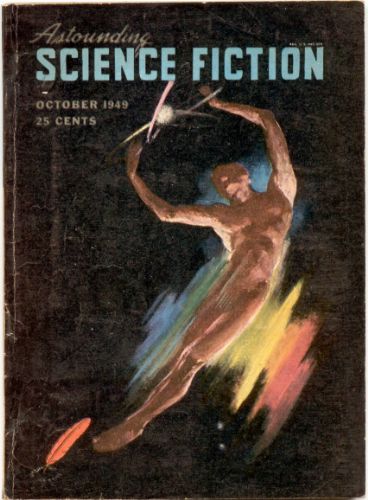Short Reviews – Chance Remarks, by J.J. Coupling, and The Great Floods, by L. Sprague de Camp
Friday , 25, May 2018 Uncategorized 9 CommentsChance Remarks, by J.J. Coupling, and The Great Floods, by L. Sprague de Camp, were the featured essays in the October 1949 issue of Astounding. They can be read here at Archive.org.
 I probably won’t normally cover the essays in Astounding, but there are a few things I wanted to spotlight.
I probably won’t normally cover the essays in Astounding, but there are a few things I wanted to spotlight.
The first essay in this issue, Chance Remarks, is a bit about cybernetics and AI-generated text using predictive patterns based on statistical placement of characters and words.
It specifically refers to Raymond F. Jones’ “Fifty Million Monkeys” and goes on to explain how computers (or rather the mathematical processes that would become associated with them) would be able to spontaneously generate text, and shows some of the degrees to which content could be generated seemingly randomly. It’s a much more approachable essay on cybernetics than the previous issue’s, and worth it for this gem alone:
In obtaining the following passage, a pair of words was chosen at random in a novel. The novel was then read through until the second of these words was encountered again, and the word following it was added, and so on. This laborious process evoked:
“THE HEAD AND IN FRONTAL ATTACK ON AN ENGLISH WRITER THAT THE CHARACTER OF THIS POINT IS THEREFORE ANOTHER METHOD FOR THE LETTERS THAT THE TIME OF WHO EVER TOLD THE PROBLEM FOR AN UNEXPECTED.”
Here we have merely an example of words chosen randomly according to certain statistics. We may, however, have a strange feeling that we have seen something like this before. Certain passages in “Ulysses” and “Finnegan’s Wake” are scarcely more intelligible.
The other essay is The Great Floods, a droll piece by L. Sprague de Camp about flood myths from around the world and historical examples. The general conclusion is that flood myths are big-fish stories that grow in the telling while having their origins in very real historical events, though once they reach a mythic stage, they can tell you very little about the actual event which may have inspired that particular myth. “And if any whole continent ever sank beneath the ocean, it must have been so long ago that our ancestors were still sitting on a branch and scratching, and couldn’t have created any Atlantean Empire.”
That’s a pretty cool cover.
Nice how “Astounding” is half the size of “Science Fiction”. Obviously, the editors wanted potential customers to know that this magazine was all about scientifically sciencey science in a fictional mode with–perhaps–something “astounding” in there somewhere.
-
I have seen it suggested that this was in preparation to renaming the magazine to something like Street and Smith’s Science Fiction (Magazine). S&S had magazines in other genres with names of a similar form; so, this is credible. Then S&S dropped all its (other) pulp magazines, eliminating those siblings and a host of new, digest magazines sprang up with “Science Fiction” in their name. The “Astounding” in the logo suddenly grew in size — but not to its original size. It would be another decade before the “Astounding” would permanently disappear.
“We may, however, have a strange feeling that we have seen something like this before. Certain passages in “Ulysses” and “Finnegan’s Wake” are scarcely more intelligible.”
I”ve never read them to compare, I’ll admit. But I suspect they were qpite a bit more comprehensible. Joyce’s work (including what I *have* read of it) is meant to be read as nonsense by the hoi polloi, while having Deep Inner Meaning if you’re anal-retentive–whoops! I mean *erudite*!–enough to labor through the endless wall of bad puns, homynyms used to obscure the spelling, deliberately allusive misspellings [not the same thing, just ask him), etc. The object of the exercise, as with most modern abstract art, was to feed the egos of the anal–ahh–*ERUDITE*!–while putting the literal-minded peasants in their place.
A truly random text like this leaves no room for intellectual arrogance. Unless, of course, they write thirty pages of explanation *claiming* that it has Deep Inner Meaning. I mean, who’s gonna know, right?
And de Camp still sounds like de Camp. If you know you’re right and he’s wrong, it’s not hard to explain how stupid he is to be that wrong. And what made him that stupid.
He wrote some good farces, though.
-
“He wrote some good farces, though.”
That really does seem to have been his strong suit. Always poking fun, never really BELIEVING in the story or characters even while writing it. Pretty much the opposite of how Robert E. Howard approached things.
It occurs to me those pronouns were misleading.
I meant–
“And de Camp still sounds like de Camp. If A knows he’s right and B is wrong, it’s not hard to explain how stupid B is to be that wrong. And what made him that stupid.”
Hope that’s clearer.
All two hundred plus of the Great Flood stories, with many of them with similar elements it seems, are just big fish stories.
Also, there are about 300 underwater cities worldwide about fifty miles off the coast. None of those could be Atlantis which got flooded at the end of the Ice Age thus leading to the Movement of the Sea Peoples as Atlantaens and others sought new homes.
NOTpossible. BadTHINK.
-
Well done. Doubleplusgood quackspeaker. 🙂
J. J. Coupling is the pen name of John Pierce, a pioneer inventor in vacuum electronics. He had a sense of irony like Yogi Berra’s.